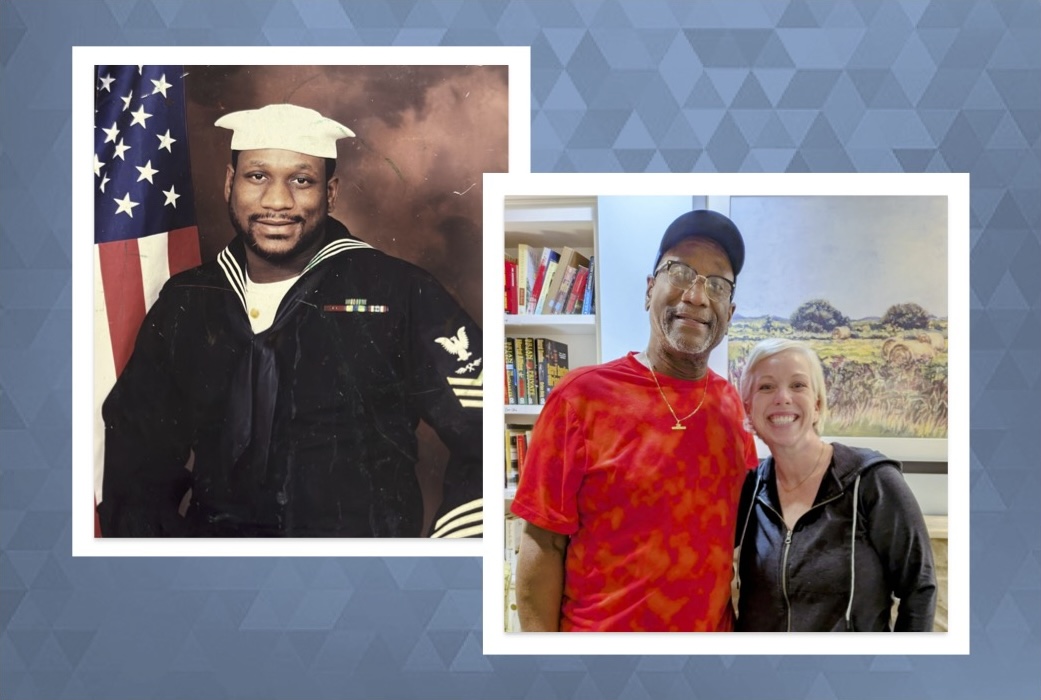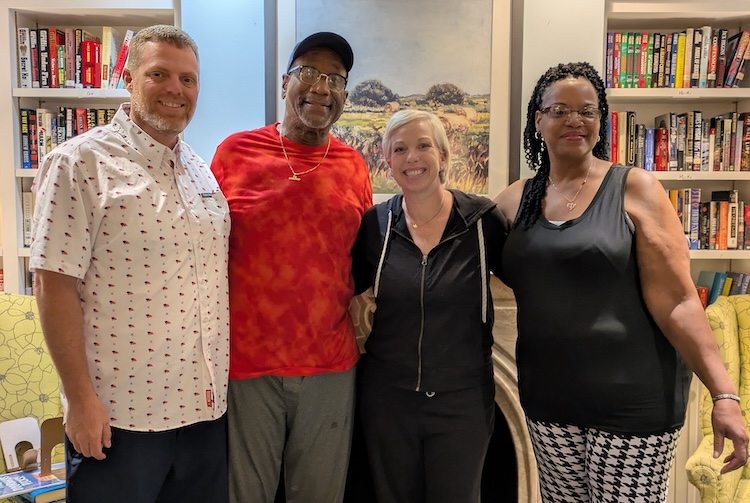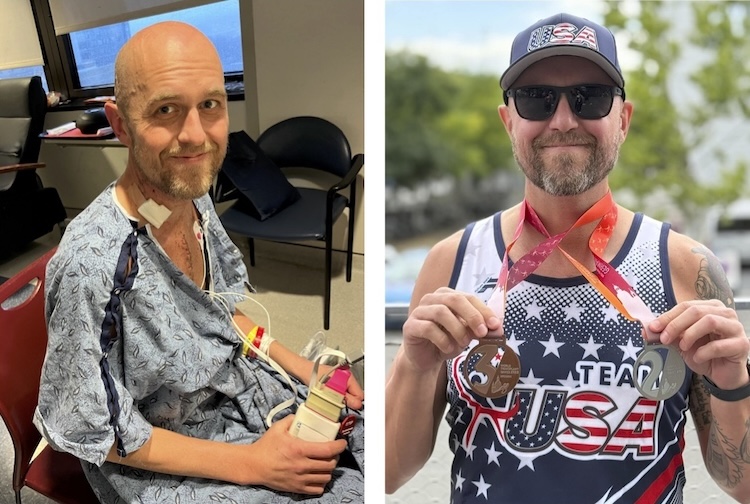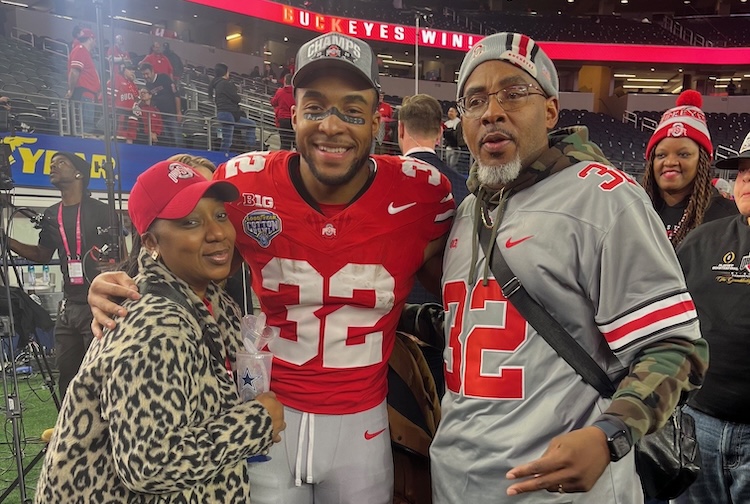A second chance for a Navy veteran, thanks to a military wife’s kidney donation
VCU Health Hume-Lee Transplant Center’s partnership with the Donor Outreach for Veterans (DOVE) program helps veterans in need of transplants.
November 05, 2025 U.S. Navy Veteran James Ellis with his living kidney donor, Alisha Beesinger. (Contributed Photos)
U.S. Navy Veteran James Ellis with his living kidney donor, Alisha Beesinger. (Contributed Photos)
By John Battiston
What often compels someone to become a living organ donor is to serve others who are in need.
This mission to serve drew Alisha Beesinger, of Lakebay, Wash., to become an altruistic donor for a unique reason: to honor loved ones who served in the United States Armed Forces.
Alisha, an office manager at her church, had never considered living organ donation until she stumbled across a Facebook post in 2023 about a veteran and mother of five in need of a kidney.
“I’ve had an extremely blessed life of being healthy. I’ve never had health issues slow me down from doing anything,” Alisha said. “My blood type matched this lady’s, so I thought, well, I could give her my kidney.”
That’s when she signed up with Donor Outreach for Veterans (DOVE), an organization dedicated to pairing altruistic donors with veterans in need of transplants.
Although another donor ultimately matched with that veteran, Alisha decided to stay in the DOVE program. And a year later, she matched with a man living across the country in another Washington, the United States capitol.
Her decision to give him her kidney carried personal significance: Her husband is a veteran, her brother served in combat and her son had just joined the Air Force.
“What better way to give back than to do something like this?” Alisha said.
The DOVE program is a strong resource for veterans in need of transplantation and their loved ones who want to become living organ donors. The organization is also a meaningful connection for the organ transplant teams who serve these patients. VCU Health Hume-Lee Transplant Center, where Alisha donated her kidney, works closely with the DOVE program.
“Our partnership with the DOVE program connects two powerful forms of service — military service and living organ donation,” said David Bruno, M.D., FACS, director of Hume-Lee Transplant Center. “Living donors who step forward to help someone they’ve never met — especially a veteran who has given so much — demonstrate the very best of what it means to serve others.”
High-tech robotic innovations in the operating room
James Ellis, a U.S. Navy veteran, had endured years of dialysis after renal failure caused by hypertension. The surgery offered him a second chance.
“When you do dialysis, it takes so much out of you. I went through it four times a week, four hours at a time,” he said. “Now, with a new kidney, I can do what I want and eat what I want and go wherever I want.”
Initially, Alisha expected her donation to take place at another transplant center in Maryland. But delays there led DOVE to ask if she would work through Hume-Lee Transplant Center instead. She agreed and flew to Richmond in October 2024 for her evaluation.
Later, she recalled having been “really impressed” from her first experience with VCU Health and Hume-Lee.
“The nurses and everybody else working there didn’t just treat it like I was there to donate my kidney; they made it feel like I was part of something really exciting,” she said.
Living donors who step forward to help someone they’ve never met — especially a veteran who has given so much — demonstrate the very best of what it means to serve others.
David Bruno, M.D., FACS, director of VCU Health Hume-Lee Transplant Center
Alisha’s living donor procedure was led by Amit Sharma, M.D., and performed with robotic assistance, a cutting-edge approach that minimizes pain and scarring, and speeds recovery.
“With the approach of the robot and the skill of our surgeons, the patient is up and walking around the day after the surgery, and they are discharged by day two or day three,” explained Dhiren Kumar, M.D., medical director of living kidney donation at Hume-Lee.
For James, surgical director of kidney transplantation Muhammad Saeed, M.D., completed the transplant, while Kumar and the broader team coordinated his medical preparation and recovery. The result, Kumar noted, was transformative.
“Mr. Ellis has been doing excellently with no major complications,” he said. “Along with being off dialysis, all his restrictions associated with poor kidney function are now gone. His quality of life is much better.”
Meeting the stranger who saved his life
Although their surgeries happened the same day, Alisha and James did not properly meet until afterward. However, James later recalled Alisha passing through the waiting room where he, his wife and daughter had been prior to the operation.
“She had a DOVE sweatshirt on, so I thought, DOVE must be really popular around here,” he said. “My daughter followed her to ask if she was getting an organ, too. She came back and said, ‘No, Dad, that’s your donor!’”
When the donor and recipient finally spoke, Alisha — who named her kidney “Lois” before parting with it — said it was “very surreal.”
“I’ve never met this person before, but to see him and know that he’s got my kidney in him was amazing,” she added.

Left to right: Jeremy Beesinger; Alisha’s husband, James Ellis; transplant recipient, Alisha Beesinger; living kidney donor, and Ann Ellis, James' wife. (Contributed photo)
Their families further connected during their stay at The Doorways, a nonprofit hospitality house for medical patients in downtown Richmond.
He’s about the same age as my dad, and his daughter is my age,” Alisha said. “Getting to hear his story solidified for me that I absolutely did the right thing.”
“Everybody was talking like we’ve known each other for years,” James added.
Despite living over 2,000 miles apart, James says the Beesingers are now “considered family.” He regularly reaches out to update his donor after his follow-up appointments, telling her that “Lois” is doing well.
The power of living organ donation
Recipients of deceased-donor kidneys can expect the organ to last roughly 10 to 15 years after transplantation, while a kidney from a living-donor could last on average up to 20 or more years. And patients who receive a living-donor kidney transplant have a 5-year life expectancy of 95%, compared to 60% for patients on dialysis — a prognosis Kumar said, “is actually much worse than most cancers.”
Patients waiting on a deceased-donor transplant often wait several years for their turn on the list. Whereas with living donation, “when the donor is ready, the recipient is ready. From a mortality perspective, from a quality-of-life perspective, and from a waiting-in-line perspective, there is a significant benefit,” Kumar said.
James and Alisha hope more veterans and their families will explore living organ donation.
“You can live with only one kidney,” James said. “I’m a true testimony to that right there, because I’m doing great right now.”
“Receiving a kidney from a living donor can take you through almost the rest of your life,” Alisha added. “Realizing James gets to move forward now with no dialysis and can live a normal life — that’s a beautiful thing.”




